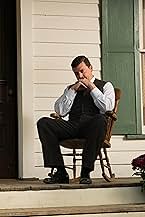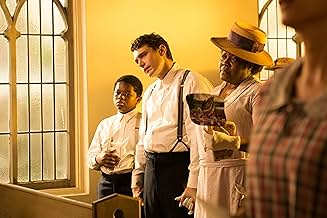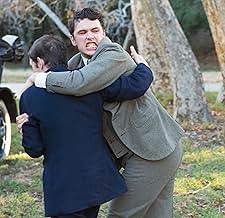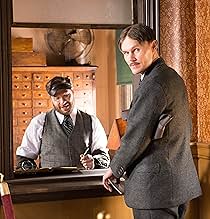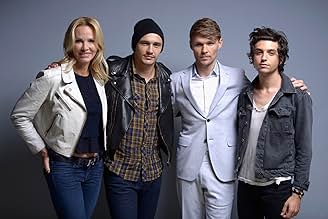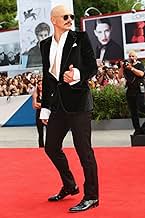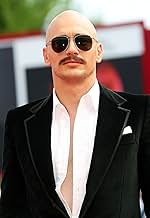VALUTAZIONE IMDb
4,9/10
1329
LA TUA VALUTAZIONE
Aggiungi una trama nella tua linguaA look at the trials and tribulations of the Compson family, living in the Deep South during the early 20th century.A look at the trials and tribulations of the Compson family, living in the Deep South during the early 20th century.A look at the trials and tribulations of the Compson family, living in the Deep South during the early 20th century.
Recensioni in evidenza
I might change my mind at some point, but ever since seeing this film I've been asking myself what, if anything, James Franco could have improved with this difficult adaptation of a difficult book, and I haven't thought of anything yet. The real question is whether a film-maker ought to revise the source material to make it easier for the public to understand. Yes, he should, is the answer if all that matters is the commercial viability of the film. No, he shouldn't, if he's creating a work of art, and that what Franco has done here. I didn't think he had it in him. If you've read the book a few times, enough to disentangle the narrative, you'll appreciate what's been done. The book is divided into three parts. Part 1 focuses on Benjy and his experiences. Because Benjy has no grasp of time, past and present are mixed up confusingly. One lovely touch in the film is the way that random thoughts of Benjy are heard in his sister's voice, because he has no voice of his own. Part 2 is the story of his mentally disturbed brother Quentin. In the film, as in the book, it helps to know that there are two Quentins. The other one is Benjy's sister Caddy's daughter. In the book, Quentin's story is interrupted by partially informative streams of consciousness. In the film, the conclusion you reach is that here is a deeply disturbed young man, just about able to pass himself off as 'normal'. Again, the flow of time is as disordered as the man. Part 3 is, finally, a coherent narrative structure, focusing on brother Jason, the man with the worst anger management problem in the world. The film has matched all three parts as well as a film possibly could, and if you hate it, as my partner did, then you'd probably hate the book, and I could understand why. But I have to say that James Franco has created one of the best-made films I've seen recently, and I admire him greatly for doing so. It makes me optimistic about the forthcoming 'In Dubious Battle'.
I'm not a big fan of Faulkner and always found his stories to be somewhat overemotional and difficult to understand, but I was captivated by this movie interpretation. There is a lot that is not explained as the action unfolds, and the order of events barely follow a chronological sequence, which can make it difficult for those who expect a more traditional mode of story telling. It almost felt like the images were being laid over each other, like thin paint that is applied and then allowed to dry so the colors and textures can be built up.
The acting is quite phenomenal throughout, and there's a high level of energy maintained as this confusing story circumvents about, serving as nothing more than the memoir of a family and the extreme emotional dependencies they inflict upon one another. The relentless and intense interactions are performed in a nearly senseless fashion, which I believe emulates the family's feelings of futility as they plummet through to their pathetic end.
Often, there was a mysterious musical track that almost sounded like the dull drone of a plane flying overhead, a very good way to bind the action together. If the music were more intense or melodramatic the movie could come across as sappy and ridiculous. As it is, the confusion and disparity could turn off even the most ardent viewer, but I found the experience rewarding on a number of subtle levels one might find in films by the likes of Ingmar Bergman.
The acting is quite phenomenal throughout, and there's a high level of energy maintained as this confusing story circumvents about, serving as nothing more than the memoir of a family and the extreme emotional dependencies they inflict upon one another. The relentless and intense interactions are performed in a nearly senseless fashion, which I believe emulates the family's feelings of futility as they plummet through to their pathetic end.
Often, there was a mysterious musical track that almost sounded like the dull drone of a plane flying overhead, a very good way to bind the action together. If the music were more intense or melodramatic the movie could come across as sappy and ridiculous. As it is, the confusion and disparity could turn off even the most ardent viewer, but I found the experience rewarding on a number of subtle levels one might find in films by the likes of Ingmar Bergman.
Filming ordinary books is easy; it's the stuff of the film business. Filming one of the greatest English language novels of the 20th century is really hard. Really hard.
The script is a worthy and very creditable effort which makes concessions to film and audience comprehensions; something Faulkner flouted when he forced readers to deal with the opening sixty pages of this remarkable book.
The telling is true enough, it keeps to the thread of the stories; the compromises between book and film are understandable; the portrayals are strong and the director has Faulkner's echo to work with. It is a solid entry to the book and no doubt it will be the thing students use instead of reading it.
The question is whether it works in its own right and that is more problematic because if one comes to the film via the book the comparisons are interminable. If a viewer sees it as is they could quibble with its purpose and narrative, still atypical, especially in these conventional times.
The essential quality of Faulkner's prose is effaced; it has to be as the camera replaces the text, and that is a huge loss for multifarious reasons, in particular the extreme subjectivity which must be diluted through the objective lens.
Even so, the film is admirable for its talent and effort; nor does it waste the viewer's attention.
The script is a worthy and very creditable effort which makes concessions to film and audience comprehensions; something Faulkner flouted when he forced readers to deal with the opening sixty pages of this remarkable book.
The telling is true enough, it keeps to the thread of the stories; the compromises between book and film are understandable; the portrayals are strong and the director has Faulkner's echo to work with. It is a solid entry to the book and no doubt it will be the thing students use instead of reading it.
The question is whether it works in its own right and that is more problematic because if one comes to the film via the book the comparisons are interminable. If a viewer sees it as is they could quibble with its purpose and narrative, still atypical, especially in these conventional times.
The essential quality of Faulkner's prose is effaced; it has to be as the camera replaces the text, and that is a huge loss for multifarious reasons, in particular the extreme subjectivity which must be diluted through the objective lens.
Even so, the film is admirable for its talent and effort; nor does it waste the viewer's attention.
I was a huge fan of Franco's earlier Faulkner adaptation, "As I Lay Dying," so I checked this one out even though I wasn't aware of it's existence until just recently.
As with his earlier Faulkner adaptation, it's extremely difficult to understand. This is mainly because Faulkner's original book, The Sound and the Fury, is equally difficult. You can read the book, or watch the movie, and easily have no idea what it's about. This is the nature of the beast with Faulkner, and as I get older I start to wonder if he ever meant these stories to make sense. I'm leaning towards no, but I don't think it really matters as his stories aren't about coherence, they're more about emotion and pondering this strange existence we all seem to be stuck in, not logic or reason as perhaps is hinted at by Mr. Compson's nihilistic boozy monologues.
I don't envy the task of making The Sound and the Fury into a movie, but I think it was done about as perfectly as could be expected when you're talking about one of the most disjointed, out of time, and at times rambling and incoherent stories ever told.
I only have one major complaint, in that the black servants of the Compson family are barely depicted in the film. In the book they're much bigger characters and form a sort of moral, and even hopeful element to the story, as is somewhat hinted by the movie scene of the church choir.
A few other plot points are changed, to no real harm. The final thing that struck me was that Franco's adaptation has a slightly different ending, which doesn't really make any sense. Of course, the original book ending doesn't make any more sense...not that it should. We are, of course, all living a story told by an idiot.
As with his earlier Faulkner adaptation, it's extremely difficult to understand. This is mainly because Faulkner's original book, The Sound and the Fury, is equally difficult. You can read the book, or watch the movie, and easily have no idea what it's about. This is the nature of the beast with Faulkner, and as I get older I start to wonder if he ever meant these stories to make sense. I'm leaning towards no, but I don't think it really matters as his stories aren't about coherence, they're more about emotion and pondering this strange existence we all seem to be stuck in, not logic or reason as perhaps is hinted at by Mr. Compson's nihilistic boozy monologues.
I don't envy the task of making The Sound and the Fury into a movie, but I think it was done about as perfectly as could be expected when you're talking about one of the most disjointed, out of time, and at times rambling and incoherent stories ever told.
I only have one major complaint, in that the black servants of the Compson family are barely depicted in the film. In the book they're much bigger characters and form a sort of moral, and even hopeful element to the story, as is somewhat hinted by the movie scene of the church choir.
A few other plot points are changed, to no real harm. The final thing that struck me was that Franco's adaptation has a slightly different ending, which doesn't really make any sense. Of course, the original book ending doesn't make any more sense...not that it should. We are, of course, all living a story told by an idiot.
I watched this on netflix, expecting it to be ridiculous. It turned out to be a credit to Franco's seriousness and ambition. The tone was right, the pacing was right, the visual language was right, and I thought three of the principle characterizations were fantastic (Jason III, Quentin the son, and Jason IV). Actually I liked the Dalton Ames and Cady and Luster. And the Mother too. Anyway, I accepted from the beginning that a movie adaptation of TSTF is a huge challenge - it's a book I know pretty well, and I imagine anyone who sees this movie without having read TSTF a few times would wonder WTF?
So hats off to James Franco. He's such a hottie that I don't think people give him credit for serious work. Here's it's deserved.
Lo sapevi?
- QuizJames Franco and Seth Rogen also appeared together in Freaks and Geeks (1999), Molto incinta (2007), Strafumati (2008), The Green Hornet (2011), Facciamola finita (2013), The Interview (2014), Sballati per le feste! (2015), Sausage Party - Vita segreta di una salsiccia (2016), The Disaster Artist (2017), and Zeroville (2019).
- ConnessioniReferenced in Showreel: Ol' MacDonald Had a Show (2013)
I più visti
Accedi per valutare e creare un elenco di titoli salvati per ottenere consigli personalizzati
- How long is The Sound and the Fury?Powered by Alexa
Dettagli
- Data di uscita
- Paese di origine
- Lingua
- Celebre anche come
- The Sound and the Fury
- Luoghi delle riprese
- Aziende produttrici
- Vedi altri crediti dell’azienda su IMDbPro
- Tempo di esecuzione
- 1h 41min(101 min)
- Colore
- Proporzioni
- 16:9 HD
Contribuisci a questa pagina
Suggerisci una modifica o aggiungi i contenuti mancanti


